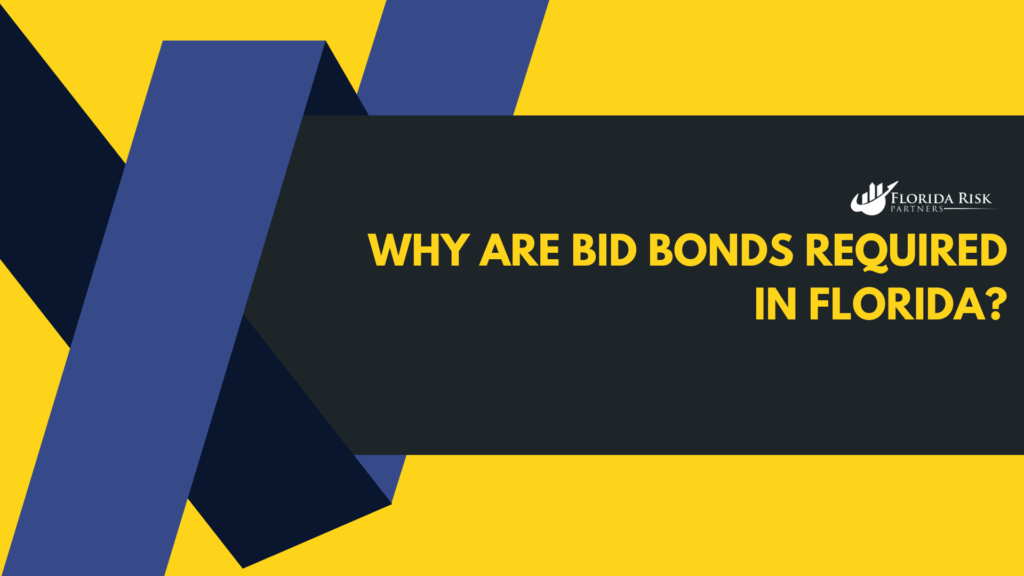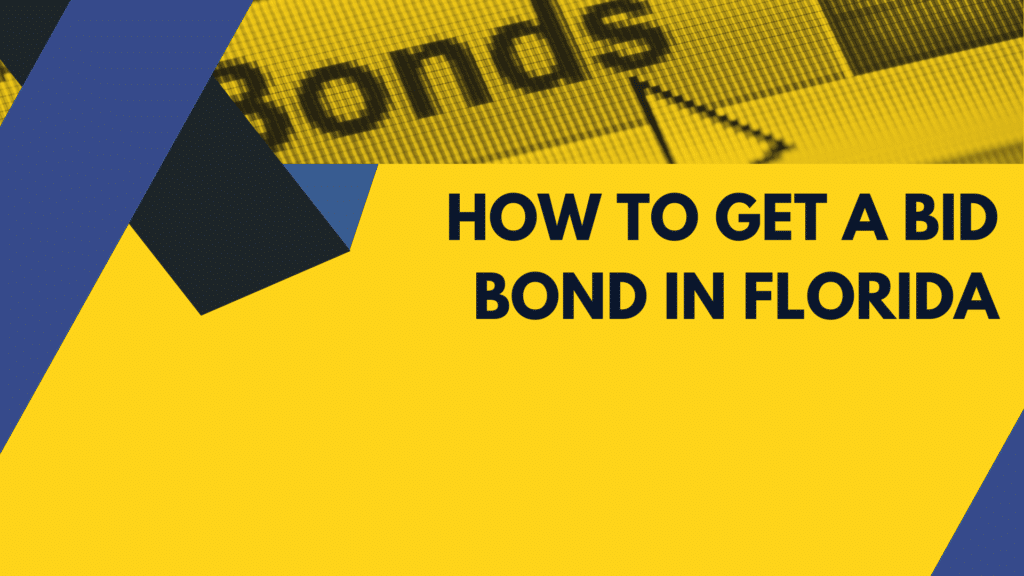-
Main Office: 1434 E. Bloomingdale Ave Valrico, FL 33596-6110
-
Phone: (888) 601-6660
-
Email: info@floridariskpartners.com

Winning the right construction job can be the difference between a banner year and a bust. In Florida—where the building boom continues across residential, commercial, and public sectors—contractors are constantly bidding on new work. But before you land that next big contract, you need to take a critical step that many overlook: securing a bid bond.
Bid bonds in Florida aren’t just a formality. They’re a signal to project owners that you’re serious, qualified, and capable of following through. If you’re bidding public work, they’re often mandatory. If you’re pursuing private projects, they can give you a powerful edge. And when managed strategically, they help you build credibility, expand into new markets, and grow your business.
In this blog, we break down everything contractors need to know about bid bonds in Florida, including what they are, why Florida requires them, how contractors can get one, and how they differ from performance and payment bonds. We also show how Florida Risk Partners streamlines the bonding process so contractors can focus on winning more jobs with less friction—thanks to our 24/7 quote, bind, and issue platform.
What Is a Bid Bond?
A bid bond is a type of surety bond that guarantees a contractor will honor the terms of their bid if selected and enter into a contract at the bid price. It also ensures that the contractor will furnish the required performance and payment bonds once the contract is awarded.
The bond is a three-party agreement between:
- Principal – The contractor submitting the bid
- Obligee – The project owner (public entity or private developer)
- Surety – The bonding company that backs the contractor’s commitment
If a contractor wins the bid but fails to proceed—either by refusing to sign the contract or not securing follow-up bonds—the project owner can file a claim against the bid bond to cover the difference between the defaulted bid and the next lowest bid.
In Florida, bid bonds are frequently required for public projects—from FDOT highway work to city building renovations. But even private developers are increasingly requiring them to protect against non-serious bidders and project delays.
Why Are Bid Bonds Required in Florida?
In Florida’s robust construction market, bid bonds serve several important purposes:
1. Prequalify Contractors
The bid bond acts as a screening tool to ensure only qualified and financially stable contractors submit bids. Sureties won’t issue a bid bond unless they’re confident the contractor can perform.

2. Protect Against Low-Bid Walkaways
Imagine a city puts a job out to bid, and a contractor underbids to win, only to later back out. Without a bid bond, the city must restart the bidding process, wasting time and money. A bid bond covers the cost difference, often up to 5–10% of the contract amount.
3. Create Accountability
When a contractor puts a bid bond in place, it signals commitment. The contractor is on the hook to perform—or the surety pays.
State and local procurement ordinances in Florida often require bid bonds on public jobs, especially for contracts over $100,000. Cities and counties frequently include bid bond requirements directly in their invitation to bid (ITB) documents.
Florida Public Sector Bid Bond Requirements
Bid bonds in Florida are governed by a combination of:
- The Florida Statutes
- Local government ordinances
- Agency procurement policies
Here are a few examples of how they’re applied:
Florida Department of Transportation (FDOT)
- Requires bid bonds for highway and transportation projects over certain thresholds
- Bond amount usually equals 5% of the total bid
City of Jacksonville
- Public Works bids require a bid bond equal to 5% of the base bid
- Bond must be issued by a surety licensed to operate in Florida
Miami-Dade County
- Requires bid security for most construction contracts over $200,000
- Accepts surety bonds, cashier’s checks, or certified checks as bid security
These bid security requirements are often enforced strictly. If your bid is missing a proper bond, it may be disqualified automatically, even if you’re the low bidder.
How Much Do Florida Bid Bonds Cost?
The good news for contractors is that bid bonds are typically free for prequalified clients. Here’s why:
- The bid bond is part of a broader bonding relationship (including performance/payment bonds).
- Sureties often don’t charge a separate fee unless the bond request is particularly complex or risky.
- If you’ve been approved for a surety line of credit, your agent can usually issue bid bonds quickly—sometimes in minutes.
What you do pay for is the performance and payment bonds if you’re awarded the contract. But the bid bond itself? It’s often the price of admission to bigger and better jobs.
The Difference Between Bid Bonds and Other Contract Bonds
It’s easy to confuse bid bonds with performance and payment bonds, but each plays a distinct role in the contract lifecycle:
| Bond Type | Purpose | When It’s Used |
| Bid Bond | Guarantees you’ll honor your bid and sign the contract | At the bidding stage |
| Performance Bond | Guarantees you’ll complete the project as agreed | After contract award |
| Payment Bond | Guarantees you’ll pay subcontractors and suppliers | After contract award |
Think of it this way: bid bonds get you in the door. Performance and payment bonds keep you in the game.
How to Get a Bid Bond in Florida

Here’s a step-by-step overview of how Florida contractors can secure a bid bond:
1. Establish a Bonding Relationship
Before you can get a bid bond, you need to work with a surety agent (like Florida Risk Partners) to get approved for bonding. This typically includes:
- Submitting financials (business and personal)
- Providing project history
- Completing a contractor questionnaire
- Establishing a surety line of credit
2. Review the Bid Invitation
Each ITB or RFP will outline the bond requirements:
- Bid bond amount (usually 5–10% of the bid)
- Deadline for submission
- Approved surety qualifications
- Required bond form (some use standard AIA forms; others use proprietary forms)
3. Submit the Bond Request
Once your surety relationship is established, you can request a bid bond for each project. Be sure to include:
- The name of the project and owner
- Bid date
- Bid amount
- Bond form (if provided)
4. Issue and Submit the Bond
The bond will be issued in your name and sent to you electronically or in original form, depending on the bid submission requirements.
Florida Risk Partners Makes Bid Bonding Fast and Easy
At Florida Risk Partners, we know that timing is everything in the bidding process. That’s why we offer a 24/7 online quote/bind/issue platform that allows you to request and issue bid bonds on your schedule—not the underwriter’s.
With us, you get:
- Instant access to your bond line
- Preloaded bond forms for Florida municipalities
- Fast approval for prequalified clients
- Secure document delivery to meet submission deadlines
- Expert guidance to help you interpret bid specs and requirements
If you’re a Florida contractor looking to grow your business, bid bonds are not a barrier—they’re a bridge to bigger opportunities. We help you cross that bridge with confidence.
Common Mistakes to Avoid with Florida Bid Bonds
Even experienced contractors can make missteps that derail a promising bid. Watch out for these common pitfalls:
1. Submitting a Bid Without a Bond
If the ITB requires a bid bond and you don’t include one, your bid will likely be rejected automatically.
2. Using an Unapproved Surety
Most public agencies require bonds to be issued by a Treasury-listed surety licensed in Florida. If yours isn’t, the bond won’t be accepted.
3. Submitting the Wrong Bond Form
Some agencies require specific forms. Submitting a generic bond when a proprietary one is required can get your bid tossed.
4. Underestimating the Time Needed
Even with a bond line in place, you should request your bid bond at least 24–48 hours before the bid due date to allow time for review, approval, and delivery.
Conclusion: Bid Bonds Are the Key to More Opportunities
In Florida’s active and competitive construction market, bid bonds are more than a requirement—they’re a strategy. They help you demonstrate professionalism, financial responsibility, and commitment to every project you pursue. And for public jobs, they’re your ticket to compete.
Whether you’re bidding a school in Broward County, a bridge in Pensacola, or a hotel renovation in Orlando, the first step is getting your bid bond squared away.
Florida Risk Partners makes that step fast, simple, and stress-free with a 24/7 platform that supports your growth at every stage of the project lifecycle. From your first bid to final completion, we’ve got your back—and your bond.
So the next time you see a project worth pursuing, don’t hesitate. Get bonded, get bidding, and get to work.
Call Us Or
Schedule an Appointment
Select an agent below to view our online calendars and select a day and time that works best for you or call us directly at 888-601-6660. When you use our online calendars, you will receive an email with more information.



